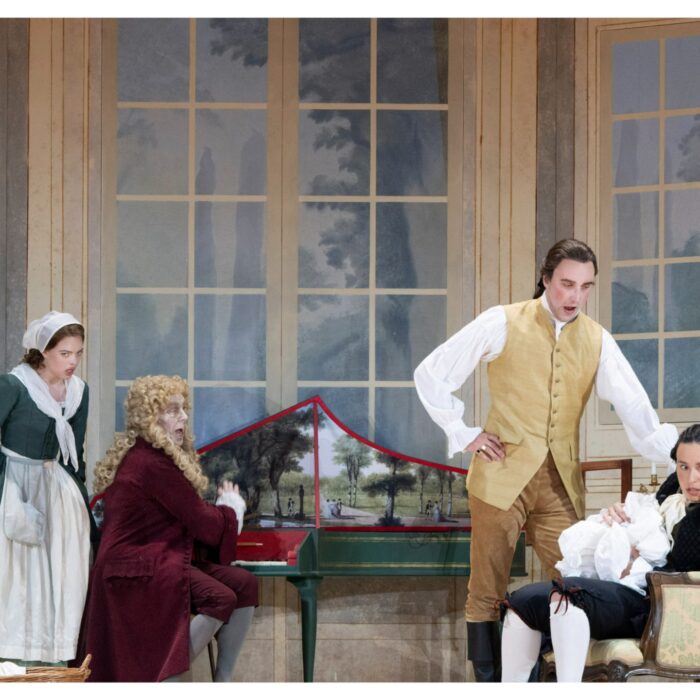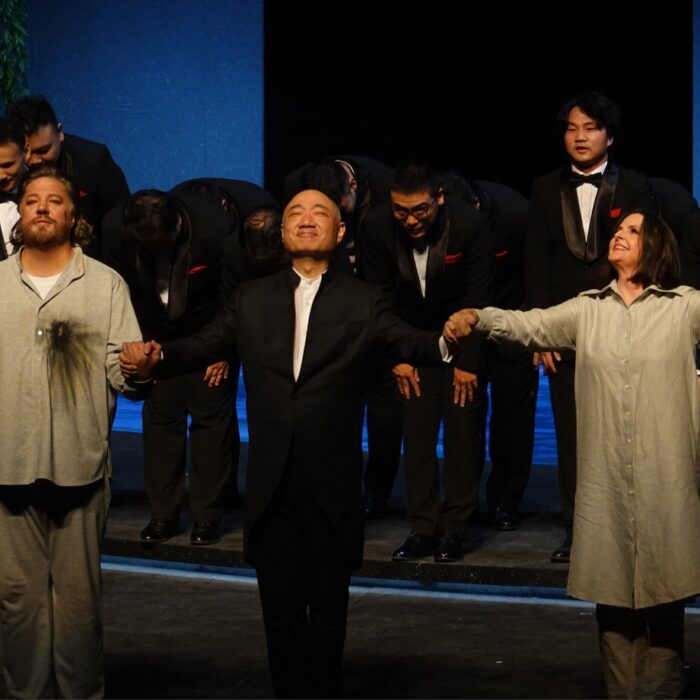
Teatro Grattacielo 2021 Review: Annual Fund Gala
Teatro Grattacielo’s Young Artists Deliver Delightful Evening of Verismo’s Hidden Gems with Guest Star Karen Slack
By Chris RuelThe young artists of Teatro Grattacielo, along with special guest star the inimitable Karen Slack, showcased rare gems of verismo arias and art songs at the company’s 2021 Annual Fund Gala presented in collaboration with Camerata Bardi Vocal Academy. Teatro Grattacielo held the gala at the opulent Columbus Citizens Foundation in New York City on Friday evening, June 18. The gala was filmed in front of an invited audience and live-streamed to those around the world.
In keeping with Teatro Grattacielo’s ambition of presenting works not regularly heard in the United States, the gala’s program comprised arias by the noted pioneers of the verismo period, Leoncavallo and Mascagni, as well as lesser-known composers Alfano, Zandonai, Giordano, Tedesco, and Pizzetti. Unfortunately, these composers’ works do not appear more often on stages or concert programs, as I found them accessible, musically satisfying, and dramatically rich.
Teatro Grattacielo’s Artistic and General Director Stefanos Koroneos shed light on why some verismo operas outside those in the standard repertoire are rarely staged. The reasons had little connection to their popularity on European stages during the late 19th and early 20th centuries. In a post-gala side conversation, Koroneos remarked some require components such as double choruses or particularly large orchestras that introduce logistical limitations for companies. As Koroneos and Grattacielo’s creative team continually dive deep into the romanticism and violent extremes for which verismo is most known, the staging requirements keep a few of the period’s most moving works unrealized in their full form, yet readily presentable in semi-staged or concert formats.
It was, therefore, delightful to hear 10 young artists, along with Slack, sing pieces from Mascagni’s “Iris,” “Lodoletta,” and “L’Amico Fritz,” Leoncavallo’s “Zaza,” and Alfano’s “Risurrezione,” along with art songs by Tedesco and Pizzetti. The sole non-Italian piece on the program was Spyros Samaras’ “Dieu faites” from “Mademoiselle de Belle.” Samaras, whose best-known work is the Olympic Hymn, wrote opera hits during his time and paved the way for giants such as Puccini. Though the composer was Greek and the text in French, Teatro Grattacielo rightfully included his work.
Karen Slack & Standout Performances
It might seem a tad unfair to place emerging artists alongside an international star such as Karen Slack. The soprano’s most recent appearance at the Metropolitan Opera was Serena in Gershwin’s “Porgy and Bess” (2019). Having Slack as a guest star surely produced some nerves among the vocalists, but her spirit and warmth could not have been more inspiring or reassuring.
While it’s difficult for a musically informed mind not to compare the sound of a well-established artist to that of vocalists growing in their profession, Slack’s presence added to, rather than detracted from, the many excellent performances by the up-and-comers.
Along with several young artists, Slack showed how crucial stage presence is and how a 360-degree approach to recital performance—solid technique, strong presence, and an ability to represent the text visually—opens the emotional door to the full force of the text and music. This is not easy for young vocalists because it requires the already vulnerable artist to climb further out on a limb. While I heard wonderful technique throughout the evening, the outstanding performances came from those who put themselves all the way out there by stepping away from the piano and into the character they represented.
Slack’s emotion-filled performance at the gala was full of power and a sonority that brings about the wonderful ringing in the listener’s head. This was on particular display in the last piece of the evening, a more well-known work by Umberto Giordano, “La mamma morta.” In this gut-wrenching aria from the French Revolution-based story of “Andrea Chénier,” the heroine Maddalena tells servant turned sans-culotte Gérard how utterly miserable she’s been since the death of her mother at the hands of revolutionaries. The hauntingly beautiful piece contains all the ingredients of the verismo style, blending conversational, melodic, and declamatory aspects as it moves from one to the other on its tragic course. And what is verismo, if not devastatingly tragic in the main? Slack didn’t hold back, giving an object lesson in vocal and acting technique to the audience and the artists watching her.
A wonderful example of the same approach came from mezzo-soprano Eugenia Forteza, whose acting ability I have praised before and has only grown stronger since I last reviewed her in 2019. For the gala, Forteza sang “Oh, pallida,” from Mascagni’s “L’Amico Fritz,” during which she thoroughly channeled Beppe, Fritz’s gypsy violinist sidekick. Beppe is a trouser role in the spirit of Cherubino (though with far less stage time), and Forteza brought the energy of the character into the open through her compelling vocal and physical expression. Teatro Grattacielo will be presenting the “L’Amico Fritz” later this fall.
Baritone Hyusoon Kim, who performed “Zaza piccola zingara” from Leoncavallo’s “Zaza,” also leaned into his interpretation, animating his voice’s deep richness and unexpected maturity with believable expression. Kim followed Slack’s “Flammen, Pietà” performance from Mascagni’s “Lodoletta,” which was not an easy feat.
Solid Presentations of Verismo’s Hidden Gems
While Forteza and Kim stood out among the emerging artists on the program, all had solid outings. None of what Grattacielo had on the menu was familiar fare, so besides performing with a big-name singer, each took on the unfamiliar and presented works in front of a live audience for the first time since the beginning of the pandemic.
Soprano Clara Lisle sang the only non-Italian work of the evening, performing Spyros Samaras’ “Dieu faites” from “Mademoiselle de Belle,” his 1905 French-language opera based on Alexandre Dumas’ 1839 play. As the opening artist, whatever nerves Lisle may have been experiencing did not show as she navigated the aria with aplomb, shading the lines with the right amount of vocal chiaroscuro.
“Apri la tua finestra,” a serenade from Mascagni’s “Iris,” was sung superbly by tenor Diego Valdez. If you have not listened to this aria, you’ll hear echoes of “Deh! Vieni alla finestra” from “Don Giovanni.” I thought the piece’s tempo was fast for a serenade, but it didn’t feel like a race to the finish.
Soprano Clara Luz Iranzo displayed enviable top notes as she sang Mario Castelnuovo Tedesco’s “La Ermita de San Simon,” a light-hearted tune about monks who can no longer say amen, only amore. Tedesco is best known for his guitar and film compositions and the influence he had on other film composers, one of whom is the great movie maestro, John Williams.
Two Ildebrando Pizzetti art songs were on the program. “Quel rosignuol che si soave piagne (The nightingale which so gently weeps)” was given a convincing performance by tenor Pedro Sequera, whose large-sized voice and strength in the lower register was impressive. Soprano Kinneret Ely who sang “Levommi il mio pensier in parte ov’era (My thought raised me to a place),” followed Sequera, with Ely’s reflective presence reinforcing the etherealness of the text.
Soprano Sarah Rose Johnson projected all-around strength in the upper and lower register. She exhibited no fear in exploring either extreme in Alfano’s “Dio pietoso” from “Risurrezione.” Fellow soprano Kiena Williams gave a thrilling performance of “Paolo datemi pace,” from Zandonai’s “Francesca da Rimini.”
Before Slack finished the evening with “La mamma morta,” tenor Donghyuk Chung produced a memorable dark timbre in the lower range during his performance of “Giulietta son io,” another Zandonai aria, this time from “Giulietta e Romeo.”
Final Thoughts
As noted in my comments about the tenors, each had full lower and middle registers that stood out but seemed a little hesitant at the top. And among the group, there wasn’t a brassy ring to be heard. This isn’t a criticism but an observation. Perhaps the music was transposed down, and that’s fine. It’s better not to strain to impress when your low and middle can do the job after a year and a half of being off stage.
Pianist Israel Gursky was supportive and a good partner to the vocalists throughout the evening.
I did lose a lot of vocal nuance amid the potent piano in a tight performance space with marble walls.
That aside, Teatro Grattacielo’s gala was a well-curated presentation of seldom-heard verismo in a beautiful setting, sung by incredibly talented young artists and an international star, all of whom reveled in sharing their gift once more with a live audience.
Categories
Stage Reviews


